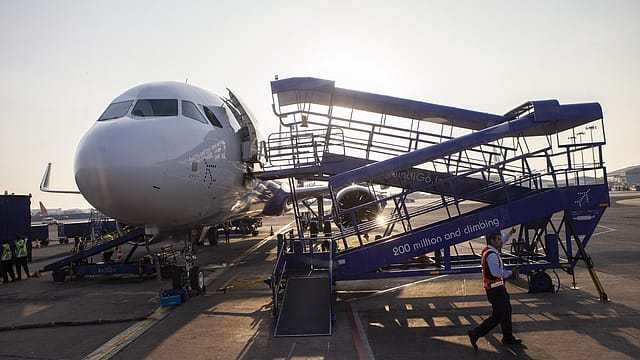IndiGo: A quiet pilot rebellion brews
ADVERTISEMENT

Even as India's largest private airline IndiGo allotted employee stock options (ESOPs) for the financial year 2021 to its top management, a quiet resentment is building up in certain sections of its staff including first officers, commanders and cabin crew who have been subject to sharp salary cuts, in part due to reduced flying hours for almost two years now.
Pilots and commanders say that the "so-called" cuts taken by the top management of the airline for the year due to the pandemic have been in effect negated by the generous allotment of stock options. They argue that they have been subjected to and have had to bear a "disproportionate" share of the pain versus the senior management.
"This is happening even as our salaries have not been reinstated. We don't see how this is justified," an IndiGo commander tells Fortune India. He says on an average, most pilots and cabin crew are earning at least 28-30% less than they were pre-pandemic. He argues that since the commanders and crew did not have a "single voice" in the airline, all their grievances fell on deaf ears. Although there is an internal platform on which they can speak directly to the management and raise their concerns, pilots say that almost nobody speaks freely on it for fear of attracting the wrath of the powers-that-be.
In the last few days, many unhappy messages on the unfair treatment meted out by the carrier to pilots and crew circulated on social media and some sections of employees raised the matter internally with their supervisors. The discontent was further fuelled by rumours on social media of expensive cars and other perks including hefty joining bonuses being handed out to the senior management team, which remained unconfirmed.
A detailed email with questions sent to the airline remained unanswered as this went to press. However, sources in the airline say that there was a proposal to review and reinstate the pilots salaries and the announcement could be expected very soon. They further add that ESOPs had never been the "preferred option" of pilots in their contracts who usually sought hard cash and immediate in-hand raises. A senior management official called it their tendency to go for "instant gratification" and not wanting to link what they earn with how the company performs.
The festering hostility and discontent raked up the issue of why the pilots failed to unite in the airline. Unionisation in private airlines in India has been actively discouraged by founders right from the Jet Airways days primarily on account of the past precedent set by the government owned Air India and Indian Airlines and partly because the pilots and the ground staff often operate as two separate entities, failing to find much common ground.
Ever since they took to the skies in India, India's private airlines too have been extremely wary and have subtly discouraged union formation. The Indian Constitution reinforces the right of workers to form unions and therefore the airlines do not expressly bar it but an undocumented policy of "divide and rule" operates. "Certain senior commanders are with the management and they act almost like informers within. This ensures that very few pilots will risk their jobs or career progression for fear of retribution," explains one former senior commander.
Pilots are licensed and entirely dependent on the airlines and DGCA for renewal of licences and progression in their careers. As a result, they always find themselves in a less than happy bargaining position with both their employers and the DGCA authorities. The management pilots — who are typically DGCA recruits and pay obeisance to it - work in sync and often join hands to harass or as they themselves put it "teach a lesson" to an errant pilot.
As a result, any attempt by pilots and commanders to unite is frowned upon heavily by airline management. In the past whenever such matters have been raised or a senior pilot has been seen as a "trouble maker," various airlines have even asked the pilot to quit or made their life difficult without much explanation. In general - and this is true across airlines - pilots hesitate to voice their concerns freely and do not make their unhappiness known, and certainly not publicly, for fear of consequences.
The management's passive-aggressive policy stems partly from the fact that the pilots are not the most amenable set of employees to deal with. Airline managements often chose the most aggressive of the lot within their senior commanders to be put in charge to deal with the juniors who could only understand one language (read: harshest). The man in charge of the pilots needed to be doubly resourceful — to be able to tackle the pilots on the one hand and demanding DGCA officials on the other. Although the relationship in some airlines has been improving, change has been and remains slow.
Way back in 2009 at the time of the formation of India’s first private airline pilots union — National Aviators' Guild - at erstwhile Jet Airways, the airline management did everything to prevent the formation of the guild and even dismissed two pilots who were the prime movers. The two were subsequently reinstated after the rest of the pilots went on strike. The drama ended with the pilots' winning the battle and the formation of the guild.